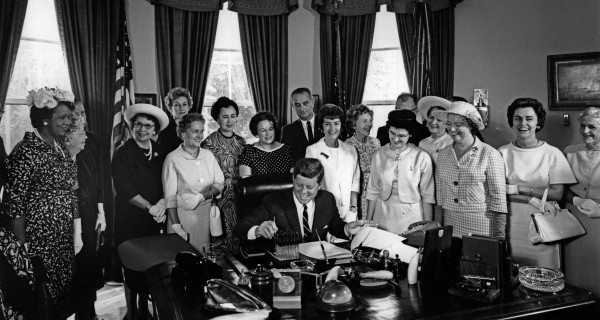 |
| Surrounded by top women leaders, President John F. Kennedy signed the Equal Pay Act into law on June 10, 1963. The act made it illegal for employers to pay women and men different wages for the same work. (Credit: Abbie Rowe, White House Photographs. Courtesy of John F. Kennedy Presidential Library and Museum, Boston) |
The IAM joins labor, women’s groups and a slew of advocates in celebrating the 50th anniversary of the signing of the Equal Pay Act, a bill that made it illegal for an employer to pay a woman and a man different pay for the same work.
President John F. Kennedy signed the legislation into law on June 10, 1963. At that time, women were paid 59 cents for every dollar men were paid. Today, that figure is 77 cents.
Although the country has made significant strides since 1963, true equality has not yet been reached, say advocates who converged on the U.S. Capitol in commemoration of the act’s anniversary.
“Fifty years after President Kennedy signed the Equal Pay Act into law, some in Congress seem content to let the pay gap between men and women continue,” said Rep. John Yarmuth (D-KY) on the floor of the U.S. House of Representatives. “In 50 years, we’ve made 18 cents worth of progress.
“Equal pay isn’t just a women’s issue. It’s a family issue. It’s an economic issue. It’s a community issue. And it’s also an issue that Congress has ignored. Congress hasn’t updated the Equal Pay Act since President Kennedy signed it into law.”
Supporters are calling on Congress to pass the Paycheck Fairness Act, a bill to expand the Equal Pay Act, as well as the Fair Labor Standards Act, close loopholes and provide stronger punishments for wage discrimination. House Democrats have twice approved the bill, but Republicans in the House and Senate continue to block it.
Dressed in red, hundreds of supporters lobbied their members of Congress, handing out packets of red M&Ms to represent how Congress has left women in the red due to its refusal to pass the Paycheck Fairness Act. Custom-printed on the candies are some not-so-sweet messages – wage gap numbers, like 77 cents.